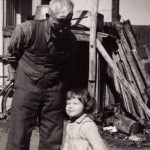![image]() Chapter 4 – The Cherubim in Exodus – by Fay Berry
Chapter 4 – The Cherubim in Exodus – by Fay Berry
There arose a new king over Egypt which knew not Joseph (Gen 50:8). The children of Israel had become a threat to the new Egyptian Pharoah because of the rapid increase in their numbers in the land. To control them and to contain them, the Egyptian King made slaves of them, as all tyrants do when they are afraid. The more the King of Egypt cursed the Jew, the greater God blessed him because the seed of Israel was “a goodly child” in God’s eyes (Ex 2:1). Moses was the personification of this “goodly child” and God preserved him when all others were destroyed by the edict of Pharaoh (Ex 1:16).
Moses was protected by becoming the “son of Pharaoh’s daughter” and a proud and talented young prince he became in Egypt. Yet he saw Egypt’s mistreatment of his Jewish brethren and thought that he could be the saviour of his people. He killed an Egyptian to protect his Jewish brother but thereby he became an outcast and a fugitive from Egypt and soon found himself no longer a prince, but a lowly shepherd for his father-in-law Jethro in the wilderness of Midian. “And the Angel of the Lord appeared unto Moses in a flame of fire out of the midst of a bush.” He looked, “and behold, the bush burned with fire, and the bush was not consumed.”
Once again we are brought “faces to faces” as it were with the Cherubim. Here is a bush, representing Moses, as an individual and Israel as a community, burning but not consumed. Moses, once “prince of Egypt,” arrogant and proud, now just a dry, prickly, useless thorn bush in a roaring wilderness. He felt “consumed,” he felt “useless to God and man.” That’s what made him valuable now to Yahweh because he was to learn that “God’s strength is made perfect in weakness.” He was now “the meekness man on the earth,” and God had chosen him to be the saviour of the Jewish world, not in his own strength, this time, but in God’s strength. He was nothing but a vehicle, just like the Cherubim was the vehicle of God.
The Cherubim was here in this wilderness where Moses stood “on Holy Ground” and the”fire” that was burning but not consuming the bush emanated from the Cherubim and the Angel of the Lord who manned this vehicle of God was Michael the Archangel, and he it was who spoke to Moses, insisting that Moses was the saviour as much as Moses was insisting that he was not.
God gave Moses his Name to take with him to Egypt; his memorial name to all generations. Michael the Archangel was the bearer of the name of God and this means that the Cherubim would go with Moses to Egypt. It would be this mighty angel who would stretch out his hand from the midst of the Cherubim, the vehicle of God, to smite Egypt with all God’s wonders when Pharaoh refused to let Israel God, (Ex 3:20).
Moses was so reluctant to go and pleaded that “he was not eloquent,” and this to the mighty God who had made his tongue in the first place! (Ex 4:11). Eventually, God relented and gave Moses Aaron to be his mouth, and speak God’s words (Ex 4:30)
In Egypt, as Moses had expected, Pharaoh’s hardness of heart meant that his people suffered much at the hand of Egypt and again and again Pharaoh refused to let Israel go into the wilderness to worship God (Ex 9:35). At last, there was “time no longer,” (Rev 10:6) for Pharaoh and there was to be one last plague, and then Pharaoh would let God’s people go.
But first the children of Israel had to be prepared for what was to come. A sacrifice of a “lamb of God” (Gen 22:8) was necessary so that Israel did not suffer the same fate as Egypt on that dreadful “day of the Lord” (Joel 1:15) which was to come that night. The death of the firstborn of Egypt was to be like an “Armageddon” (Rev 16:16) for the Egyptians and the cream of their nation would die in that one night when Michael the Archangel “passed over” the blood soaked lintels of the Jewish people. For the first, but not the last time, the Cherubim of God, the Lord of hosts, would inflict a destruction on Egypt which would be remembered in Passover feasts for generations to come.









